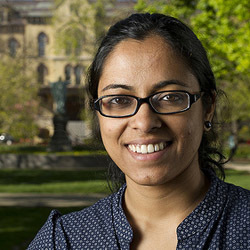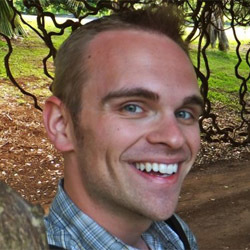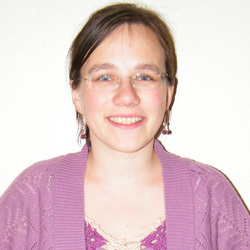
Several College of Science graduate students have recently been recognized for their hard work and research in and out of the laboratory.
Shailaja Kunda

Fourth year graduate student Shailaja Kunda was awarded the Faculty for the Future Award. Faculty for the Future fellowships are given to women from developing and emerging countries who are preparing for Ph.D. or post-doctoral studies in the physical sciences at top universities abroad. The goal of the program is to encourage more women to pursue scientific careers. Recipients of the fellowships are selected for their leadership capabilities and scientific talents, and are expected to return to their home countries to continue their careers and inspire other young women to pursue science. This is Kunda’s second year winning the award.
Kunda currently works with Francis Castellino, Kleiderer-Pezold Professor of Biochemistry, in the W.M. Keck Center for Transgene Research. Her project focuses on conantokins: peptides synthesized by marine snails and rich in post-translationally modified γ-carboxy glutamate (Gla, γ) residues. These peptides are found to have antagonistic properties towards N-Methyl-D-Aspartate receptors (NMDAR). Influx of calcium ions into neurons through these receptors result in learning, memory and plasticity. In certain neuropathologies such as Huntington's disease and epileptogenesis, persistent activation of NMDAR leads to excitotoxicity. The subunit specific inhibitory properties of conantokins can be employed as neuro-active drugs. Kunda is currently studying the structural and inhibitory properties of recently discovered conantokins from Conus parius and Asprella clade species of marine snails using biophysical and cell based functional assays.
Zachary Terranova

Zachary Terranova has won the 2013 Center for Research Computing Award for Computational Sciences and Visualization. This award recognizes outstanding contributions in the areas of computational sciences and visualization. Such contributions may include, but are not limited to: 1) applications of high performance computation and/or visualization technology; 2) development of algorithms, codes, software environments or other tools for better using high performance computing and/or visualization.
Advised by Steven Corcelli, associate professor of chemistry, Terranova studies ionic liquids, which have emerged as an important class of environmentally friendly solvents that show tremendous promise for applications involving the production, storage, and efficient utilization of energy. His research group’s microsecond-length molecular dynamics simulations reveal the molecular-level mechanisms to explain how different cations and anions respond to an instantaneous charge rearrangement.
In addition to his academic accomplishments, Terranova was recently elected as President of the Graduate Student Union (GSU). The goal of the GSU is to improve the quality of life for graduate students in the classroom, laboratory, and in everyday life at Notre Dame.
Melinda Varga

Physics graduate student Melinda Varga has been accepted into the 2013 Complex Systems Summer School at the Santa Fe Institute. She was selected for her academic credentials, research and interdisciplinary interests. Selection for the school is highly selective as there is only one spot for every six applicants. The annual program will take place from June 3-28 and consists of lectures, laboratories, and discussions sessions focusing on ideas, tools, and current topics in complex systems research in mathematical, physical, living, and social systems. Students also complete team projects related to topics discussed during the program
Varga is advised by Zoltán Toroczkai, professor of physics and concurrent professor of computer science engineering, and is working on the Boolean Satisfiability problem (an NP complete decision problem) using an analog, i.e., physics-based algorithm. Her goal is to develop a description of constraint satisfaction hardness using the methods of dynamical systems and chaos theory.
Abigail Weaver

Abigail Weaver will be completing an internship at the Food and Drug Administration’s Forensic Chemistry Center (FCC) in Cincinnati in June. The FCC provides forensic analysis of product tampering, the counterfeiting of pharmaceuticals, and the detection of food and pharmaceutical contaminants. Scientists at the FCC also conduct original research to help identify hazardous materials in pharmaceutical and food products. Her internship has been funded by the Chemistry-Biochemistry-Biology Interface Program and the Eck Institute of Global Health.
Weaver works with Marya Lieberman, associate professor of chemistry and biochemistry. The research group focuses on developing solutions for detecting counterfeit drugs. State-of-the-art diagnostics are not often available in low-resource areas of developing countries, so they have created Paper Analytical Devices (PADs), a low-tech solution that can help doctors and pharmacists determine a drugs authenticity. During her internship at the FCC, Weaver will test the ability of the PADs to detect substandard medicines and compare their accuracy and usability for field screening with a collection of hand-held spectrometers.